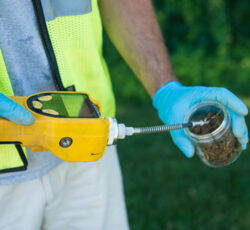
As an orchard grower, understanding the chemistry of your soil is crucial for ensuring the long-term health and productivity of your trees. Soil sampling is the first step towards analyzing your soil’s chemistry and making informed decisions about fertilization and other management practices. In this blog post, we will discuss the basics of soil sampling for orchards, why it is important, and how to interpret the results.
Why Soil Sampling is Important for Orchards
Soil sampling is the process of collecting soil samples from various locations within your orchard and analyzing them for key nutrients and other chemical properties. This information allows you to determine the soil’s fertility levels, pH, and other characteristics that can affect the growth and health of your trees. By understanding your soil’s chemistry, you can make informed decisions about fertilization, irrigation, and other management practices to optimize tree growth and fruit quality.
Without proper soil sampling and analysis, you may be applying too much or too little fertilizer, leading to nutrient imbalances that can harm your trees. Additionally, soil pH levels can influence nutrient availability, affecting the trees’ ability to take up essential elements. By routinely sampling and analyzing your soil, you can ensure that your orchard is receiving the nutrients it needs for healthy growth and high fruit yields.
How to Collect Soil Samples
When collecting soil samples for orchards, it is essential to take representative samples from various locations within your orchard. This ensures that you capture the variability in soil chemistry that may exist across different areas. To collect soil samples:
1. Divide your orchard into management zones based on factors like soil type, slope, and tree age.
2. Use a soil sampling tool to collect samples from multiple locations within each management zone. Take samples at a consistent depth, typically 6-8 inches for orchards.
3. Mix the soil from each sample location in a clean bucket to create a composite sample for each management zone.
4. Repeat this process for each management zone, ensuring that you collect enough samples to accurately represent the entire orchard.
By following these steps, you can create a comprehensive picture of your orchard’s soil chemistry and make more informed decisions about management practices.
Interpreting Soil Test Results
Once you have collected soil samples from your orchard, it is time to send them to a laboratory for analysis. Soil testing labs will typically provide you with a report that includes information on key soil nutrients, pH levels, and other chemical properties. When interpreting soil test results for orchards, consider the following factors:
1. Nutrient Levels: Look for information on key nutrients like nitrogen, phosphorus, potassium, calcium, and magnesium. These nutrients are essential for tree growth and fruit production. Make sure that nutrient levels are within the optimal range for orchards, as deficiencies or excesses can harm tree health.
2. pH Levels: Soil pH can influence nutrient availability and affect tree growth. Most fruit trees prefer slightly acidic soil with a pH range of 6.0-6.5. If soil pH is too high or too low, consider using lime or sulfur to adjust it to the optimal range.
3. Organic Matter: Soil organic matter is crucial for maintaining soil structure, nutrient cycling, and microbial activity. Aim for organic matter levels of 3-5% for healthy orchard soils.
4. Cation Exchange Capacity (CEC): CEC measures the soil’s ability to retain and supply nutrients to plants. Higher CEC values indicate better nutrient retention capacity, which can be beneficial for supporting tree growth.
By understanding and interpreting soil test results, you can make informed decisions about fertilization, liming, and other management practices to optimize tree health and productivity.
Implementing Soil Amendments
Based on the results of your soil test, you may need to implement soil amendments to address nutrient deficiencies or imbalances. Common soil amendments for orchards include:
1. Fertilizers: Based on the nutrient levels identified in your soil test, choose fertilizers that provide the necessary nutrients for tree growth. Consider using slow-release fertilizers to ensure a consistent nutrient supply throughout the growing season.
2. Lime: If soil pH is too low, consider applying lime to raise pH levels and make essential nutrients more available to your trees. Follow soil test recommendations for the appropriate amount of lime to apply.
3. Organic Matter: Incorporating organic matter into your orchard soil can improve soil structure, water retention, and nutrient availability. Consider adding compost, manure, or cover crops to increase soil organic matter levels.
By implementing soil amendments based on soil test results, you can improve soil fertility, pH levels, and overall tree health in your orchard.
Summary
Soil sampling is a critical process for analyzing your orchard’s soil chemistry and making informed decisions about management practices. By understanding soil nutrient levels, pH, and other chemical properties, you can optimize tree growth, fruit quality, and overall orchard productivity. Follow proper soil sampling procedures, interpret soil test results accurately, and implement soil amendments as needed to ensure that your trees receive the nutrients they need for healthy growth. By investing in soil sampling and analysis, you can set your orchard up for long-term success and sustainable fruit production.
Need Soil Testing in Pasco, WA?
Founded in 1992, Custom Orchard Fumigation was created by farmers for farmers. We take great pride in providing soil fumigation services to farmers throughout the state. We can also help growers find other services to help in growing their crops. We also provide all paperwork for our services to ensure all regulations are met. Our founder, Chris Ford, has a background in Forest Management, and we are conscious of reducing the environmental impact on the soil and surrounding areas of your plot. Custom Orchard Fumigation invites you to visit our website or give us a call today!
